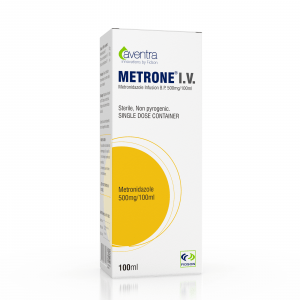Read this leaflet carefully before you start taking this medicine. (DOWNLOAD)
- Keep this leaflet. You may need to read it again before, during or after use of this medicine. • If you have any further questions, ask your health care provider.
- This medicine has been prescribed for you only. Do not pass it on to others. It may harm them, even if their symptoms are the same as yours.
- If any of the side effects become serious, or if you notice any side effects not listed in this leaflet, please inform your health care provider.
In this leaflet:
- What Metrone IV Infusion is and what it is used for
- What you need to know before you take Metrone IV Infusion
- How to use Metrone IV Infusion
- Possible side effects
- How to store Metrone IV Infusion
- Contents of the pack and other information
- WHAT METRONE IV INFUSION IS AND WHAT IT IS USED FOR
Metrone IV Infusion belongs to a group of medicines known as antibiotics. It contains the active substance metronidazole. This is a sterile solution for intravenous infusion free from bacterial endotoxin (substances causing fever reactions). This medicine is used when oral medication is not possible, for the prevention and treatment of infections caused by certain species of bacteria. It is used in adults and children for:
- the prevention of posto-perative infections due to sensitive bacteria in surgical procedure with a high risk of occurrence of this type of infection
- the treatment of severe established abdominal and gynaecological infections where sensitive bacteria have been identified as the cause or are suspected to be the cause
Metrone IV Infusion must only be used under medical supervision. If you need any further information on your condition, please ask your doctor.
- WHAT YOU NEED TO KNOW BEFORE YOU TAKE METRONE IV INFUSION You must not be given Metrone IV Infusion:
- If you are allergic to metronidazole or other ingredients of this medicine.
Take special care with Metrone IV Infusion if you have:
- Severe liver damage
- A blood formation disorder
- A disease of the brain, spinal cord or nerves.
Therefore, your doctor determines whether you should be treated with Metrone IV Infusion.
If convulsive fits or any other nerve problems or symptoms (e.g. numbness in limbs) become apparent during therapy, your treatment will promptly be revised.
Treatment with Metrone IV infusion should not usually be continued for longer than 10 days; the treatment period will only be extended in exceptional circumstances and if absolutely necessary. Repeat therapy with metronidazole will be restricted to cases where this is absolutely necessary. In such a case, you will be monitored particularly carefully.
Treatment must be stopped or revised immediately if you get severe diarrhoea which may be due to a severe large bowel disease called “pseudomembranous colitis” (see also section 4.) Cases of severe liver toxicity/acute liver failure, including cases with a fatal outcome, in patients with Cockayne syndrome have been reported with product containing metronidazole. If you are affected by Cockayne syndrome, your doctor should also monitor your liver function frequently while you are being treated with metronidazole and afterwards.
Tell your doctor immediately and stop taking metronidazole if you develop stomach pain, anorexia, nausea, vomiting, fever, malaise, fatigue, jaundice, dark urine, putty or mastic coloured stools or itching.
As prolonged use of metronidazole may impair blood formation (see section “Possible side effects”), your blood counts will be monitored during treatment.
Other medicines and Metrone IV Infusion
Please tell your doctor or pharmacist if you are taking or have recently taken any other medicines, including medicines obtained without a prescription.
Amiodarone (used to treat irregular heartbeat)
When you receive this medicine, your heart function should be monitored. You should see your doctor if you notice any heart function abnormalities, dizziness or fainting.
Barbiturates (an active substance in medicines to treat epilepsy or seizures) The duration of action of metronidazole is reduced by phenobarbital; your metronidazole dose may therefore have to be increased.
Birth control pills
Your birth control pill may be less reliable while you are being given metronidazole.
Busulfan
Metronidazole should not be given to patients receiving busulfan because in that case, toxic effects are more likely to occur.
Carbamazepine (a drug for the treatment of epilepsy)
This combination also warrants caution because metronidazole may increase the duration of action of carbamazepine.
Cimetidine (a drug for the treatment of stomach ulcers)
Cimetidine may reduce the elimination of metronidazole in isolated cases and subsequently leads to increased serum metronidazole concentrations.
Coumarin derivatives (drugs that inhibit blood clotting)
Metronidazole may enhance the blood clotting inhibition brought about by coumarins. So if you are taking a medicine that inhibits blood clotting (for example warfarin), you may need less of it during treatment with metronidazole.
Cyclosporin (a drug used to suppress undesirable immune responses)
When cyclosporin is given together with metronidazole, the blood levels of cyclosporin may increase. Your doctor will therefore have to adjust your cyclosporin dose as appropriate. In addition, your kidney function will be monitored.
Disulfiram (used in alcohol withdrawal therapy)
If you are taking disulfiram, you must not be given metronidazole, or disulfiram must be stopped. Combined use of these two drugs may lead to states of confusion up to the point of a serious mental disorder (psychosis).
Fluorouracil (an anticancer drug)
The daily dose of Fluorouracil may have to be reduced when giving it together with Metronidazole because metronidazole may lead to an increase of the blood level of Fluorouracil.
Lithium (used to treat mental illness)
Treatment with lithium preparations requires particularly careful monitoring during treatment with metronidazole, and the dose of the lithium preparation may need to be re-adjusted.
Mycophenolate mofetil (used for the prevention of rejection reactions after organ transplant) Its effect may be weakened by metronidazole. Careful monitoring of the effect of mycophenolate mofetil is recommended.
Phenytoin (a drug for the treatment of epilepsy)
If you are taking phenytoin, your doctor will treat you with metronidazole only with caution because metronidazole may increase the duration of action of phenytoin. On the other hand, phenytoin may reduce the effect of metronidazole.
Tacrolimus (used to suppress unwanted immune reactions)
The blood levels of this agent and your kidney function should be checked when starting and stopping treatment with metronidazole.
Metrone IV Infusion with alcohol
You must not drink any alcoholic beverages while you are being given metronidazole and for 48 hours after finishing your course. Drinking alcohol while using Metronidazole 5 mg/ml may cause you to feel very unwell with symptoms such as palpitations, flushing, sweating, dizziness and vomiting.
Pregnancy, breast-feeding and fertility
If you are pregnant or breastfeeding, think you may be pregnant or are planning to have a baby, ask your doctor for advice before taking this medicine.
Pregnancy
If you are pregnant, your doctor will not treat you with metronidazole unless she/he considers this absolutely necessary.
Breast-feeding
You should not breast-feed during treatment with metronidazole and not resume nursing for another 2–3 days thereafter because metronidazole passes into breast milk.
Fertility
Some animal studies did suggest a possible negative effect of metronidazole on the male fertility, but this was only with doses much higher than is recommended for humans.
Driving and using machines
You should not drive or use any machines while being treated with metronidazole as metronidazole may impair alertness. This is even more the case at the beginning of treatment or when you have drunk alcohol.
- HOW TO USE METRONE IV INFUSION
Dosage
Dosage depends on the nature and severity of your illness, your age and body weight, and your individual response to treatment. The following dosages are usually prescribed:
Adults and adolescents over 12 years
Treatment of infections:
Usually, you will be given 300ml of the medicine (corresponding to 1500mg of metronidazole) on the first day of treatment. From the second day of treatment onwards, you will receive 200ml of the medicine (corresponding to 1000mg of metronidazole) every day.
As an alternative, you may receive 100ml of the medicine (corresponding to 500 mg of metronidazole) every 8 hours.
At the beginning of your treatment your doctor may give you an initial higher dose of metronidazole. In most cases treatment will take 7 days. Only exceptionally treatment may be continued beyond this time.
The dose is usually the same for patients with kidney disease. However, if you are receiving dialysis treatment, your doctor may adapt your dose on the days of your treatment.
For patients with liver diseases, lower doses may be required.
Prevention of infections that might occur after operations
When used for prevention of infection in surgery, you may be given 500 mg of the medicine before the operation. The dose will be repeated 8 and 16 hours after the operation.
Use in children
Dosing in children is based on body weight.
Treatment of infections:
Age Dosage
8 weeks to 12 years: 20 – 30mg of metronidazole per kg body weight per day as a single dose or 7.5mg of metronidazole per kg body weight every 8 hours.
The daily dose may be increased to 40mg of metronidazole per kg body weight if infection is severe.
Under 8 weeks: 15mg of metronidazole per kg body weight as a single dose daily or 7.5mg per kg bodyweight every 12 hours.
Newborns of less than 40 weeks gestation age: As metronidazole may accumulate in these patients during the first week of life, the concentration of metronidazole in the blood will be checked after a few days of treatment. Usually, treatment will take 7 days.
Prevention of infections that might occur after operations:
Age Dosage
Less than 12 years: 20 – 30mg of metronidazole per kg body weight as a single dose given 1 – 2 hours before surgery
Newborns of less than 40 weeks gestation age: 10mg of metronidazole per kg body weight as a single dose before surgery
Method of administration and duration of treatment
Metrone IV Infusion is administered through a drip directly into a vein (intravenous infusion). The infusion of one bottle usually takes 60 minutes, but it should not be done within less than 20 minutes. This medicine may be diluted in a suitable solution for infusion. The entire metronidazole treatment period is usually 7 days and must not exceed 10 days. It will only be extended in exceptional circumstances and if necessary. If you are concurrently receiving other antibiotics, your doctor will give you those medicines separately.
If you receive more Metrone IV Infusion than you should
Undesirable effects, as described in the next section, may occur as signs or symptoms of an overdose. There is no known specific antidote or specific treatment of a massive overdose, but metronidazole can be removed by dialysis (that is treatment with artificial kidney) from the body.
- POSSIBLE SIDE EFFECTS
Like all medicines, this medicine can cause side effects, although not everybody gets them. Side effects occur mostly at high doses or with prolonged use.
The following terms are used to describe the frequency of side effects:
- ‘Very common’ affects more than 1 of 10 treated patients
- ‘Common’ affects 1 to 10 of 100 treated patients
- ‘Uncommon’ affects 1 to 10 of 1,000 treated patients
- ‘Rare’ affects 1 to 10 of 10,000 treated patients
- ‘Very rare’ affects less than 1 of 10,000 treated patients
- ‘Not known’ frequency cannot be estimated from the available data
The following side effects may be serious and, therefore, require immediate treatment:
Rare:
- Severe persistent diarrhoea (possibly a symptom of a severe bowel infection called pseudomembranous colitis)
Emergency management of pseudomembranous enterocolitis
In the event of severe persistent diarrhoea, you must promptly inform your doctor because this may be due to pseudomembranous colitis, a serious condition that must be treated immediately. Your doctor will stop metronidazole and provide appropriate treatment.
- Severe acute hypersensitivity reactions up to allergic shock (swelling of the face, lips and airway as well as low blood pressure, shortness of breath, collapse and even death)
Very rare:
- White blood cells and platelet counts may decrease during treatment (granulocytopenia, agranulocytosis, pancytopenia, thrombocytopenia). Regular monitoring of blood cell counts is necessary during prolonged use.
- Hepatitis (liver inflammation), jaundice, inflammation of the pancreas (isolated reports) • Brain disorders, lack of coordination
- Severe inflammatory rash on mucous membranes and the skin with fever, redness, and blistering, in extremely rare cases up to skin detachment over extended areas (Stevens-Johnson Syndrome, toxic epidermal necrolysis)
Not known:
- Mild to moderate hypersensitivity reactions, a special kind of rapid swelling of the skin of your face called angioedema
- Gaze spasm, damage, or inflammation of the nerves of your eyes
- Reduced white blood cell count, severe anaemia
- Seizures, nervous disorders such as numbness, pain, furry sensation or tingling in the arms or legs • Inflammation of the meninges (or brain lining) that is not caused by bacteria (aseptic meningitis)
Other side effects include
Common
- Infections with yeasts (e.g. genital infections)
Uncommon
- Darkened urine (due to a metabolite of metronidazole)
Rare
- Changes in ECG (electrical activity of the heart)
Very rare:
- Psychotic disorders, including states of confusion, hallucination,
- Headache, dizziness, drowsiness, fever, disturbance of sight and movement, giddiness, speech defects, convulsions
- Visual disturbances, e.g., double vision, short-sightedness
- Liver function disorders (such as elevated serum levels of certain enzymes and bilirubin) • Allergic skin reactions like itching, hives
- Joint and muscle pain
Not known:
- Sickness, feeling sick, diarrhoea, inflammation of tongue or mouth, belching and bitter taste, metallic taste, pressure above the stomach, furry tongue
- Difficulty swallowing
- Reduced interest/appetite for food (anorexia)
- Sad (depressed) mood
- Sleepiness or sleeplessness, muscle twitching,
- Reddening and itching of the skin (erythema multiforme)
- Vein wall irritation (to the point of inflamed veins and thrombosis) after intravenous administration, states of weakness, fever
Reporting of side effects
If you get any side effects, talk to your healthcare provider. This includes any possible side effects not listed in this leaflet. By reporting side effects you can help provide more information on the safety of this medicine.
- HOW TO STORE METRONE IV INFUSION
- Keep all medicines out of reach of children.
- Store below 30°C in its original package, protected from light.
- Do not use Metrone IV Infusion after the expiry date which is stated on the carton and label after ‘Exp Date’. The expiry date refers to the last day of that month.
- FURTHER INFORMATION.
What Metrone IV Infusion contains
Metrone IV Infusion contains 500mg/100ml Metronidazole.
What Metrone IV Infusion looks like and contents of the pack
100ml LDPE infusion bottle placed in a carton with insert.






